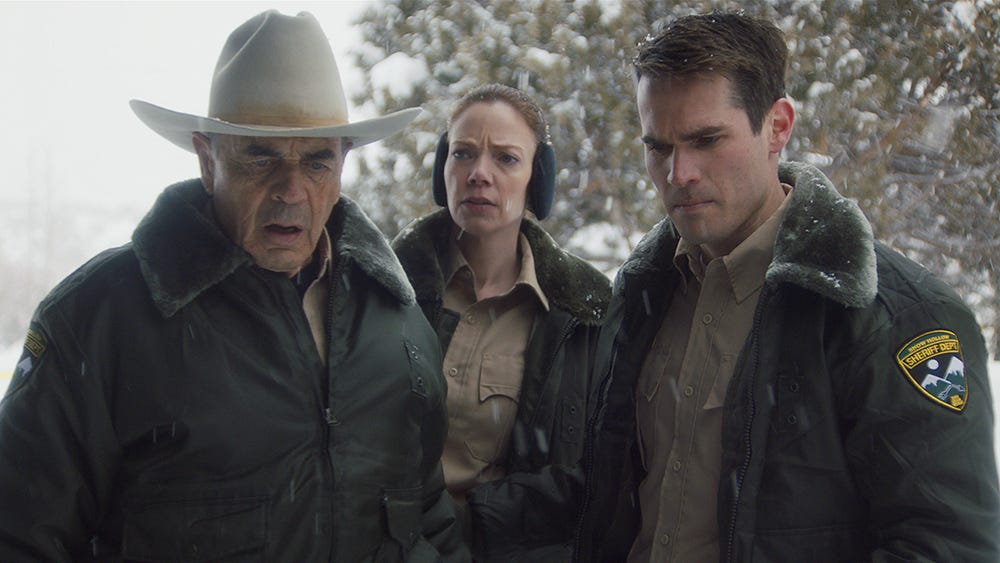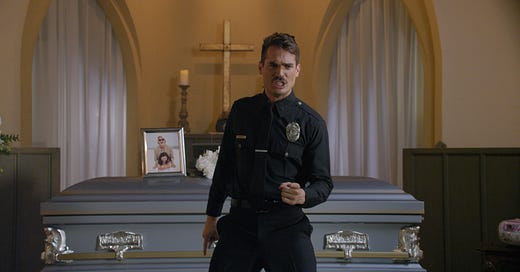
Jim Cummings and His Anti-Protagonists
The writer-director-star who creates people we hate ourselves for loving.
This essay will discuss plot points from Thunder Road, The Wolf of Snow Hollow, and The Beta Test.
The films of Jim Cummings are fascinating in part because they defy easy categorization. Thunder Road is a seriocomic drama dealing with the vicissitudes of modern life, drug addiction, and family problems. The Wolf of Snow Hollow is part comedy and part horror, but wholly about conceptions of masculinity and duty that get wrapped up in alcoholism and family drama. And The Beta Test is a post-Harvey Weinstein erotic thriller with a funny side that doubles as a critique of social media.
More interesting than the plots or the genres, though, are the characters Cummings himself is playing. In both Thunder Road and The Wolf of Snow Hollow, he’s portraying cops who, all things considered, probably shouldn’t be cops: They’re emotionally unstable, prone to mood swings, lacking in empathy for others, and at least a little dangerous. And in The Beta Test he’s playing an adultery-minded* talent agent in the middle of a fight between screenwriters and the mega-agencies over packaging deals whose phoniness and hollowness give him an almost inhuman, skin-crawling quality.
What Cummings does with these characters is deceptively disarming. Rather than treating them as simple fools to be mocked or dangerous charlatans to be exposed, he portrays them as, well, real: complicated humans dealing with a variety of traumas. The opening shot of Thunder Road is a go-to example of this and for good reason: It’s just a camera pushing in on Cummings’s Officer Jim Arnaud in a funeral home as he stumbles his way through an emotional tribute to his recently deceased mother. It’s absurd and funny and disarming, yet underneath it all there’s something unquestionably offputting that a man in a police uniform is behaving in such an unhinged fashion.
But this isn’t the moment that’s stuck with me most from the picture. No, that comes later, when Jim is confronted with the corpse of his soon-to-be-former wife, dead of a drug overdose. What jumps out is the sense of restrained anger, a combination of hatred for the fact that their daughter had to discover their mother’s body and a sort of visceral resentment that he’s going to be the one who has to deal with this.
It’s a deeply human moment, though one that few of us would like to admit we can see a reflection of ourselves in. We like to think of ourselves as better than that, more forgiving. And characters in films often are better than that because there’s nothing a filmmaker fears more than creating a protagonist you don’t like because you relate to the ugliness of yourself within him.

Cummings (right) as Deputy Sheriff John Marshall in ‘The Wolf of Snow Hollow,’ with Robert Forster and Riki Lindhome.
Time and again Cummings grants his characters that sort of familiar ugliness. As someone who can be a bit high-strung myself, I found myself nodding along more than I probably should have as John Marshall (Cummings, again) loses his patience with his fellow cops in The Wolf of Snow Hollow. Increasingly exasperated by his coworkers lending credence to the idea that a werewolf is stalking their snowy town, and overwhelmed by the bodies that are piling up, Marshall is the opposite of a natural leader. He defaults to snark, to sarcasm, to screaming—“Do your job! Do your job! I am begging you!”—in a way that is both funny, relatable, and deeply unbecoming of the awesome power his position wields.
I think it is fair to say that some critics are flummoxed by the performances in these films. As one of the (relatively few) negative reviews of Snow Hollow put it, “Playing a violent, sexist cop for dark laughs is a questionable venture in 2020 when there’s little to no real catharsis, only violence and self-pitying, brooding men.”
This critique misses the mark—rather badly, I think—but this miss occurs because Cummings has created a character, as screwed up as he is, who still feels real and human. We empathize with him because he is overwhelmed just as we disdain him because he is incompetent and lacks empathy himself. There’s this very quick moment toward the end of the film when Marshall is returning some evidence from a crime scene where a mother and her young daughter were killed to the mother/grandmother of the victims. He’s going through the motions, being very perfunctory about it and this woman spits in his face.
In another, lesser film, this would’ve caused Marshall to take a moment to reflect. The spit might drip down his chin as he stood there and thought about his mistake, the accidental cruelty of it. In Snow Hollow, however, he jerks back in disgust, wounded by the expectoration, and throws the box of evidence on the ground, annoyed and angry at the woman for her response to his callousness.
Which of these behaviors feels more realistic to you?

Cummings as Jordan in ‘The Beta Test.’
“Antihero” is a term that could be used to describe the characters played by Cummings in these films; they are lacking in traditional heroic qualities, after all. But I don’t think it quite fits, at least in the common way we use the term nowadays to mean “a villainous person we cheer for,” e.g., a Tony Soprano or a Walter White. Don Draper is probably closer, but with Draper there was a certain element of wish fulfilment that accompanied the disdain: He’s a dapper, handsome, and successful ladies’ man, after all. A smoothie, he’s definitely a smoothie.
Cummings’s characters are the opposite of smoothies: They’re twitchy and easily flustered, prone to breakdowns at moments of stress. And they’re just not very good people, if we’re being honest. One can be forgiven for being somewhat taken in by Jordan (Cummings yet again) in The Beta Test, a Hollywood agent who is given the opportunity to partake in a no-strings-attached romantic tryst weeks before his wedding, an opportunity presented to others around Los Angeles that results in several murders. We are made to empathize with his general powerlessness; we feel his frustration as he tries to learn who has brought him into this sexual game and why. Sure, he looks a little silly as he tries to court a Chinese magnate or when his agency is talking about remaking Caddyshack with dogs, but who among us hasn’t looked a little silly at work from time to time?
But if you don’t realize by film’s end—as Jordan breaks down, blubbering, his stock phrases (“it’s exciting, let’s keep talking”) pouring out like he’s a robot stuck in a logic loop, his whining that he wishes things could go back to the way they were in the 1990s, before Harvey fucked everything up for would-be Masters of the Cinematic Universe—that he’s not only pathetic but also a horrible person, a representation of everything that’s wrong with not only Hollywood but life in general, I have to wonder if you’ve really been watching.
Like I said: I don’t love the term “antihero.” Cummings’s creations feel more like anti-protagonists. You can’t help but disdain them even if there’s something about them that renders them relatable. There’s no easy condemnation to be offered and no absolution to be given. The lack of catharsis is the point. Life doesn’t come with ready-made bundles of forgiveness or perfectly packed lessons: It’s messy, it’s complicated, and it’s filled with people whom you recognize and with whom you empathize but in whom you hope to never see yourself.
That you might see yourself reflected in that dirty mirror despite your fervent hope not to? Well, that’s what great art does. Welcome to the era of the anti-protagonist.
* Technically it’s not quite adultery, given that he’s only engaged to be married as he attempts to indulge in an affair.











